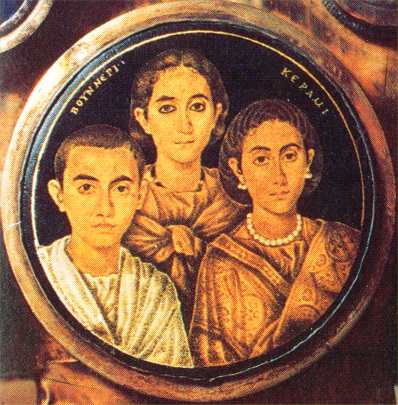Vivia Perpetua
The North African martyr Vivia Perpetua wrote a portion of the account of her martyrdom "by
her own hand:"
"The young catechumens, Revocatus and his fellow-servant
Felicitas, Saturninus and Secundulus, were apprehended. And among them also was Vivia Perpetua,
respectably born, liberally educated, a married matron, having a father and mother and two brothers, one of whom,
like herself, was a catechumen, and a son an infant at the
breast. She herself was about twenty-two years of age.
From this point onward she shall herself narrate the whole
course of her martyrdom, as she left it described by her own
hand and with her own mind. 'While,' says she,
'we were still with the persecutors, and my father, for the sake of his
affection for me, was persisting in seeking to turn me away. .
.'" (The Passion of the Holy Martyrs Perpetua and Felicitas,
Chapter 1, Sections 1-2, Writings of Cyprian Volume II,
Ante-Nicene Christian Library, pp. 277-278).
The narration was then continued by another party. The tragic waste of the Roman persecution of Christians is clear in this narrative;
Vivia Perpetua had an infant child, a boy, from whom she was torn by the
insane malice of her persecutors.

Marcella
Marcella suffers from the disadvantage of being a fictional character.
Certainly 'Thekla,' who turns up in her company, is fictional; and
if your friends are fictional, questions might be raised about you.
Marcella is one of the participants in Methodius' 'Banquet of the Ten
Virgins.' She commends the "spiritual meditation of the Scriptures:'
"Now the whole spiritual meditation of the Scriptures is
given to us as salt which stings in order to benefit, and which
disinfects, without which it is impossible for a soul, by means of
reason, to be brought to the Almighty; for “ye are the salt of the
earth,” said the Lord to the apostles." (Marcella, in Methodius, The Banquet of
the Ten Virgins, Discourse 1, Chapter 1).
One might think, she means only that she and her fellows should
meditate on Scriptures which had been read aloud to them. But it
turns out that she and her sisters are quite adept at flinging
verses: "If, however, any one should venture to find fault with our
argument as destitute of Scripture proof, we will bring forward
the writings of the prophets, and more fully demonstrate the
truth of the statements already made." (Methodius, The Banquet of
the Ten Virgins, Discourse 1, Chapter 3). Her arguments, complex and
difficult, are not destitute of "Scripture proof," nor are theirs. How, if they are not
literate?
Oh, but she's fictional. Like it's her fault. What we know about the
historical Socrates is that he hated democracy. In Plato's
dialogues, 'Socrates' presents the 'Theory of Ideas;' but in Xenophon's
dialogues, he is aware of no such set of circumstances. Some readers
speculated that, in his Sicilian sojourn, Plato encountered the
writings of Pythagoras and there discovered the 'Theory of Ideas,'
inserting it in the mouth of his 'Socrates' sock-puppet. The
Platonic dialogues are fictional. Some of the Roman philosophical
dialogues present themselves as stenographic records of actual
encounters. Some may have been. But if Methodius made 'Marcella' and
her sisters up, at least he thought his readers would not guffaw at
the idea of ten literate women delving into scripture.
Akin to Marcella is her sister Theophila, who says, "For I think I have
perceived clearly from the Scriptures that, after He had brought in
virginity, the Word did not altogether abolish the generation of
children; for although the moon may be greater than the stars, the
light of the other stars is not destroyed by the moonlight."
(Methodius, The Banquet of the Ten Virgins, Discourse 2, Chapter 1).
How did she perceive this "from the Scriptures" if she could not
read them? Thaleia commends her, "For you seem to me, O Theophila,
to have discussed those words of the Scripture amply and clearly,
and to have set them forth as they are without mistake." (Methodius,
The Banquet of the Ten Virgins, Discourse 3, Chapter 2). She knows
this how? She concludes her remarks, "Let any one who will, take in
his hand the Epistle to the Corinthians, and, examining all its
passages one by one, then consider what we have said, comparing them
together, as to whether there is not a perfect harmony and agreement
between them." (Methodius, The Banquet of the Ten Virgins, Discourse
3, Chapter 14). Realize that, according to Bishop Spong, she is talking to a
group incapable of taking in hand the Epistle to the Corinthians or
any other writing, other than to wave as a fan; so why does she say it?
Procilla exhorts her sisters, "For if you will look at the books
of Moses, or David, or Solomon, or Isaiah, or of the prophets who
follow, O virgins, you will see what offspring they have left, for
the saving of life, from their intercourse with the Son of God."
(Methodius, The Banquet of the Ten Virgins, Discourse 7, Chapter 4).
According to Bishop Spong, they could look at these indeed, but not
read them. Tusiane, like Marcella, commends meditation upon the scripture:
"Whoso, therefore, desires to come to that Feast of
Tabernacles, to be numbered with the saints, let him first procure
the goodly fruit of faith, then palm branches, that is, attentive
meditation upon and study of the Scriptures, afterwards the
far-spreading and thickly-leaved branches of charity, which He
commands us to take after the palm branches. . ." (Methodius, The
Banquet of the Ten Virgins, Discourse 9, Chapter 4).
She nowhere mentions that this goal is impossible of attainment. The ten virgins' symposium, fictional as it may be, testifies to literacy amongst
Christian women.

Eusebia
One hesitates to include this formidable lady, the emperor
Constantius' wife, in this company, not only because she was an
Arian but owing to the ruling family's appalling habit of
simplifying the succession by murdering those family members whose
continued existence would tend to complicate it. Julian the
Apostate, who came to power through her patronage, remembered her as
a saint, a paragon of disinterested kindness, but others remembered
her differently. Nevertheless, in looking at Christianity as a
social reality whether accompanied by any parallel spiritual reality
or not, it is worth noting that this lady, of Greek stock and
consular heritage, was well-educated and influential:
"Under these circumstances he was at a loss how to act. It happened, however, that when the empire was in the greatest danger, Eusebia, the wife of Constantius, who was a woman of extraordinary learning, and of greater wisdom than her sex is usually endowed with, advised him to confer the government of the nations beyond the Alps on Julianus Caesar, who was brother to Gallus, and grandson to Constantius."
(Zosimus, New History, Book 3, at
tertullian.org).
According to Julian, she was a competent orator: "For she
herself did not say more, and that though she knew how to utter
speeches not a whit inferior to those of the most gifted
orators." (Julian the Apostate, Panegyric on the Empress Eusebia,
Section 123). She was a generous, and bookish, gift-giver: "For she gave me
the best books on philosophy and history, and many of the
orators, and poets, since I had brought hardly any with me from
home. . ." (Julian the Apostate, Oration III, Panegyric on the
Empress Eusebia, Section 123-124).

Aetheria
This lady went on pilgrimage to the Holy Land in the fourth century and wrote a lengthy letter recounting her
experiences, addressed to her 'ladies, reverend sisters.' It seems she visualized these parties as literate,
as she herself would seem to have been, because she says to them,
"Now it would be too much to write of all these things one by one, for so great a number could not be remembered, but when your affection shall read the holy books of Moses it will more quickly recognize the things that were done in that place."
(Letter of Aetheria,
ccel).
Her language is not literary Latin but popular. She promises when she comes home to bring with her new and improved versions of various apocryphal writings
(she is perhaps a touch naive) to show her 'sisters:' "For although I
have copies at home, yet it seemed to me more pleasant to receive them from him, lest perhaps something less might
have reached us at home, and indeed that which I received here is
fuller. So if Jesus our God bids it, and I come home, you too shall read them, ladies, my own souls."
She does not explain how they were to do this if, ex hypothesi, they were illiterate.

|


